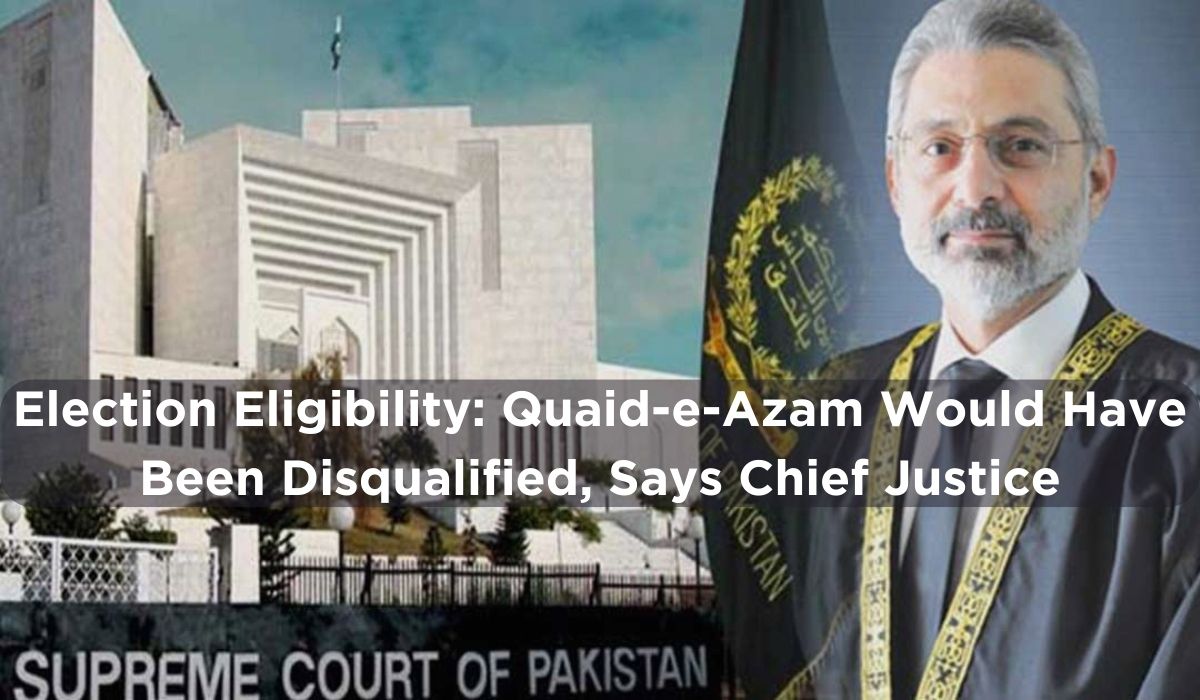Chief Justice Faez Isa says that if the eligibility to contest elections had been disclosed, even Quaid-e-Azam would have become ineligible; once someone is punished, why doesn’t the matter end? How can it be that after the punishment, elections cannot be contested? According to details, a 7-member larger bench of the Supreme Court under the chairmanship of Chief Justice Justice Faez Isa heard the case of disqualification. Attorney General, at the beginning of the hearing, took the position that ‘under Article 62 (1)(f), the decision of disqualification should be reviewed’, to which Chief Justice inquired, ‘Has anyone challenged the amendment to the Election Act? Will all the Advocate Generals confirm or oppose the position of the Attorney General?’ All the Advocate Generals confirmed the position of the Attorney General on amending the Election Act.
During the hearing, Chief Justice asked, ‘What is your position, Attorney General? Should the Election Act run or the decisions of the Supreme Court?’ In response, the Attorney General said, ‘The court is requested to review the decision of disqualification because it is a law made by the parliament.’ It has been revealed that during the hearing in the Supreme Court, Saqib Jillani, the lawyer of Mir Badshah Qaisrani, who filed a request against disqualification, also opposed disqualification and said, ‘I filed a request in 2018 when the decision of disqualification came under Article 62 (1)(f). Now, Section 232 has been added to the Election Act, and disqualification cannot be pursued beyond the limit set in Section 232 of the Election Act.’
Chief Justice inquired, ‘Has anyone challenged the Election Act 2017 in court?’ The court was informed that ‘the Election Act has never been challenged in any court.’ The Attorney General said, ‘The effect may be that a law is overridden by the Supreme Court. In the case of Semealullah Bloch, the court overlooked a point, and as long as judicial decisions are available, the declaration of disqualification remains in place.’ Chief Justice remarked, ‘We are sinners and seek forgiveness from Allah. The duration of disqualification in Article 62 is not specified in the Constitution; the courts have filled this void.’ On this occasion, Justice Mansoor Ali Shah asked the Attorney General, ‘The question is whether the period of disqualification mentioned in the Election Act will be more important than the Constitution? It is a matter of interpretation of Article 63; the disqualification for violating the integrity and ideology of the country is 5 years. Can anyone affirmatively say that he is the owner of good deeds? If Quaid-e-Azam had been the leader in 2002, he would also have been disqualified.’
Chief Justice remarked, ‘The language of Article 62 and Article 63 is the same; under Article 63, the disqualification for violating national integrity and ideology is 5 years. Can anyone swear that he can be disqualified for committing heinous crimes such as murder and treason for some time? How can the court issue a declaration against someone for ordinary reasons?’ Chief Justice said, ‘Article 62 (1)(f) and Article 63 (1) are one; the court can determine the duration of disqualification under Article 63; can anyone say that he is the owner of good deeds? If in 1985 the military commander could include Article 62 and 63 in the Constitution, how can a martial law administrator set the standard of eligibility in the Constitution? On this occasion, Jahangir Tareen’s lawyer said, ‘The Supreme Court, by considering Article 62 and 63 separately in its decision of disqualification, made a wrong decision.’ Chief Justice inquired, ‘Are you saying that there is a flaw in the decision of disqualification under Article 62 (1)(f)? Now the law will apply; why were you disqualified?’ Makhdoom Ali Khan replied, ‘Disqualification occurred due to misdeclaration. The Supreme Court changed the decision in the Panama case in the first phase without stating a reason, in the second phase.’
Later, the court adjourned the hearing of the case until January 4 at 11 am.
